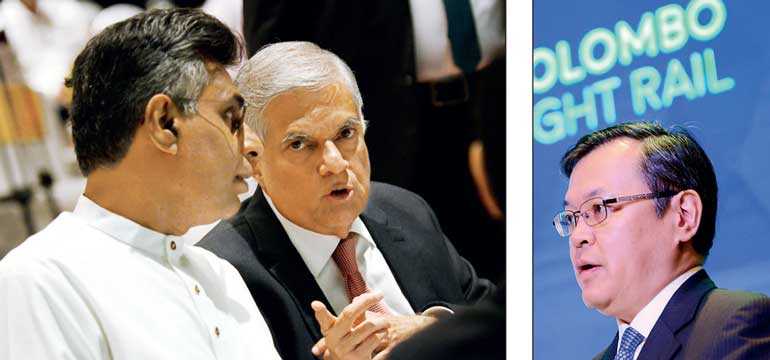Tuesday Feb 17, 2026
Tuesday Feb 17, 2026
Thursday, 4 July 2019 03:17 - - {{hitsCtrl.values.hits}}

Prime Minister Ranil Wickremesinghe speaks with Megapolis and Western Development Minister Patali Champika Ranawaka at the launch of Japanese-funded Light Railway Transit (LRT) project. Right: Japanese Ambassador Akira Sugiyama - Pix by Shehan Gunasekara
Project example of modernisation by Govt., says PM
Believes public witnessing birth of a new capital
Prospect of LRT already increased land prices by 129%, says Ranawaka
Project to commence in 2020 and open in 2025
To reduce travel time from Malabe to Fort to 30 minutes
Sixteen stations, 25 trains with 800-passenger capacity each
Funding from Japan on 40-year concessional loan
By Uditha Jayasinghe
Aiming to revolutionise Colombo’s transport system, the Government yesterday launched the $2.2 billion Japanese-funded Light Railway Transit (LRT) project, which Prime Minister Ranil Wickremesinghe said is one of the key ventures by the Government to modernise Sri Lanka.
Speaking at the launch ceremony, Wic-kremesinghe praised Megapolis and Western Development Minister Patali Champika Ranawaka for spearheading the venture and formulating plans at a rapid pace so construction could begin next year. He also noted that the LRT project, together with the Port City and the elevated highway from the Kelaniya bridge, were examples of how the Government has worked to modernise Colombo.
“We are witnessing the birth of a new capital. Despite all the challenges faced by the Government, we have still managed to push Sri Lanka towards modernisation. A country cannot grow by staying in the same place or moving backwards. We have to modernise – not just in transport, but education, healthcare, housing and other infrastructure. That is how Sri Lanka has transformed itself into one of the fastest growing cities in South Asia,” he said.
The Prime Minister also said that modernisation was aimed at ensuring the marginalised and underprivileged also benefit from development projects. He pointed out that under the Megapolis and Western Development Ministry, apartments have been built for low income families and efforts are being made to effectively utilise limited land within the capital.
“Under the LRT project,disabled people will find mobility easier. Lower time and costs spent on transport means there will be a greater benefit to the economy,” he added.
Megapolis and Western Development Minister Champika Ranawaka emphasised the LRT would only be one aspect of the modernisation planned for Colombo. He noted that next year, the Manning Market would be moved out of Fort, and the railway and bus stations would be amalgamated into one multi-model transport hub.
“This corridor is set to be one of the fastest growing pieces of real estate in Colombo. Already since the project was announced, land prices in Malabe and surrounding areas have increased by 129%. In that sense, this project has already brought results to the people,” Ranawaka said.
“This is one of the largest projects undertaken by the Government. The second and third phases from Malabe to Kaduwela and Malabe to Kottawa, respectively, will cost much less as we have already invested in the main infrastructure, including the depot facilities. This will have the most comfortable, safe, affordable, and passenger-friendly features in addition to park and ride facilities for selected stations and shopping malls to meet the daily needs of commuters.”
The LRT is expected to reduce travel time between Malabe and Fort to just 30 minutes with 16 stations along the way. During peak hours, the trains will pass a station every three minutes, and limitedstop trains are expected to be introduced during off-peak hours that will reduce the time to 28 minutes.
The project includes a LRT hub in Malabe with plans already underway to extend it to Athurugiriya or Kottawa, officials said. The Government is also planning to introduce the Light Railway Transit Act,which will provide the legal basis for the project to be developed and will provide the venture with the powers to establish a company to run and maintain the LRT system as well as provide a feeder bus system. Project officials hope to obtain funding from the Green Climate Fund.
The project is expected to start construction in 2020, after the completion of the details design and tender process, and it will be completed in 2024, allowing the LRT system to be opened to the public in 2025. Around 25 trains will be used for this LRT system and each train will be made up of four cars with a total capacity of 800 passengers.
The total investment for the project is $2.2 billion, and $1.85 billion will be provided by the Japan International Cooperation Agency (JICA) as a soft loan. The interest rate of the loan for the civil works and procurement of equipment is 0.1%, and for the consultancy services is 0.01% per annum. The repayment period is 40 years, which includes a 12-year grace period.